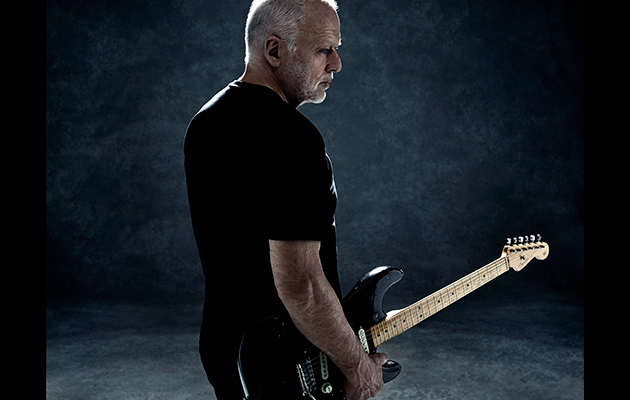Nick Laird-Clowes is just back from a holiday in France. He has been staying in Ramatuelle, on the southeast coast below Saint-Tropez, where Gilmour and Syd Barrett went camping when they were 16 years old. “I texted David,” explains Laird-Clowes, “saying ‘I’m sitting outside your favourite pizza place.’ It’s where he and Syd would sit and look at girls. He wrote back, ‘WIWT’. ‘Wish I Was There’. So many things happened for so long, there’s so much shared stuff.”
Laird-Clowes first met Gilmour in 1978; their initial collaboration came three years later, as Holly And The Ivys. “It was a Christmas record,” reveals Laird-Clowes. “We were sitting in an airport one day and David was joking about these terrible Stars On 45 records. He started stamping his feet four on the floor going, ‘Once in royal David’s city…’ Then I started singing, ‘La la la la lala…’ He said, ‘Hang on! That’s a great idea.’ The night before we recorded the orchestra, he said, ‘If you can write a song, you can have the B-side.’ So I stayed up all night writing the B-side.”

Gilmour continued his patronage of Laird-Clowes, inviting his band The Act (featuring Gilmour’s younger brother Mark on guitar) to rehearse at his home while Pink Floyd recorded The Wall in France. “We used this little old studio in the house he bought from Steve Marriott,” says Laird-Clowes. “It was near Harlow in Essex. We used to take the Central line and then walk a few miles to the house. It was a lovely little Tudor-looking cottage and it had a building in the garden a bit like a garage – not big – and he had an eight track in there.”
Their collaborations continued with Laird-Clowes next band, The Dream Academy, when Gilmour played bass and programmed drums on their cover of The Smiths’ “Please, Please, Please Let Me Get What I Want”. In 1993, Laird-Clowes contributed lyrics to two songs on The Division Bell: “Poles Apart” and “Take It Back”.
“David would say, ‘Come over next Monday and I’ll play you what we’ve done,’” recalls Laird-Clowes, who is currently working on a new album. “Polly, he and I would drink a bottle or two of wine, listen and make notes. Then it was every Tuesday, then it was Tuesday and Wednesday. We were down to the last three songs and he didn’t have any lyrics. We tried everything. We did cut-ups; we stayed up insanely let and got very merry doing it. If I wrote four consecutive lines, I got a co-write. For ‘Poles Apart’, I asked him about Syd and he said, ‘I never thought he’d lose that light in his eyes’. That’s where it started. He said, ‘Great, you’ve written your first song on a Pink Floyd record. What year were you born?’ Then he went down to the cellar.”
“Division Bell was David having gone through hell in the dispute over Pink Floyd,” says Po. “Then coming out the other side saying, ‘I can make a record as good as anything we did when we were with Roger.’ It gave him a tremendous boost of morale.”
The Division Bell tour – 110 shows in 68 cities, taking a worldwide gross of £150 million – overshadowed even the band’s enormous tours of the Seventies and Eighties. But at what point did the scale and extravagance begin to lose their appeal to Gilmour?
“Pink Floyd is very, very big,” he concurs. “There are an awful lot of people who want to go to those shows. I find it hard to quite imagine how many of them actually really love everything about it. I don’t know. Maybe that’s fatuous. But that huge scale is intoxicating. It fuels your ego and all that. But it’s never quite ideal. I don’t mind playing a few big ‘uns, once in a while. But now I’m very happy not to be quite as – what’s the word – famous, I was going to say, but I don’t know how to put that subtly.”

After The Division Bell, Gilmour withdrew into domestic life. He followed his old band’s brief reunion at Live8 in July, 2005 with On An Island in March, 2006. A meditative album, it shared many stylistic touches and textures with the later Pink Floyd releases. “It would be in the vein of a Pink Floyd record, because that’s what I do,” he says. “I can’t help myself, using the musical palette that I have been either gifted with or have learned over the years. I can’t really separate the two things with any intent.”
“In the Seventies, people started doing offshoot albums and called them solo albums,” adds Phil Manzanera. “But this is a continuation of what David’s always been doing, but in a different context. At a certain point, this happens in bands. You grow up, you have families and your life changes. It’s the same with Bryan Ferry: he’s just doing what he’s always done, but it’s in his own world. It’s not like it used to be, where people did a solo album and then came back to the band. We all morphed out of that. We’re not confined by the things that we started in our 20s.”



